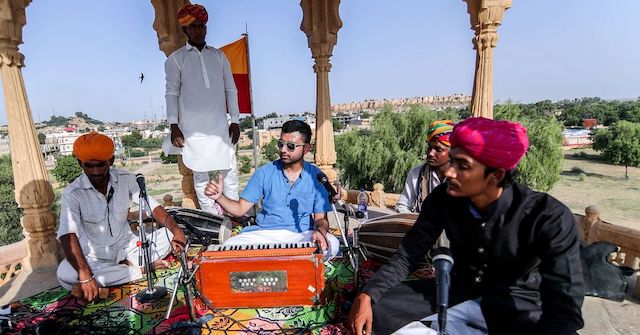
Find more images and read the full story here | Learn more about
Music and dance | Nomadic and Semi-Nomadic Tribes | Performing arts | Tribal identity >>
Folk music is an indelible part of India’s storied oral tradition. Songs emanating from the tribal folk tradition are critical fragments of this country’s vast cultural diversity. Based on simple instruments and arrangements, articulated by voices of the soil, and set across different geographical locations and cultural contexts, these songs are a celebration of nature and the human condition.
In an era when music is based on electronically-generated soundscapes, a young social entrepreneur, Abhinav Agrawal (26) started the Anahad Foundation, a not-for-profit organisation that works towards recording, preserving, documenting and consolidating the available knowledge of the evolution of Indian tribal folk music. […]
The Anahad Foundation aims to break the shackles that have held back tribal folk music. […]
Although the organisation is based out of New Delhi, the foundation and their team of volunteers travel to tribal villages with a mobile studio recording system to record the work of these artists under their ‘Project Equals’ initiative, which brings tribal folk musical communities into the mainstream. Once the composition is vetted for originality, it is converted into a digital format. The copyright to this composition is then given to the composer. […]
“Either the tribal artist or someone from the community possessing a certain amount of literacy is taught to become artist managers in their own right, providing them with CDs, business cards and pen drives. In the event that they do not understand a particular piece of contract or any such document, we help them overcome communication barriers.” […]
This month the foundation and its band of volunteers are travelling to Punjab, Jharkhand, Chhattisgarh and Karnataka for research on tribal folk groups
Find out more about the Anahad Foundation: https://anahad.ngo/
Source: “How This Organisation Is Giving India’s Tribal Musicians a New Lease of Life” by Rinchen Norbu Wangchuk, TheBetterIndia.com, November 17, 2017
URL: https://www.thebetterindia.com/121371/anahad-tribal-music/
Date visited: 21 August 2022
[Bold typeface added above for emphasis]
“We are so much more than that. We follow a tradition rich in music, dance and love.” – Author Swarnalatha who runs an NGO that works for the upliftment for people of her Irula community >>
“The great diversity of music in India is a direct manifestation of the diversity and fragmentation of the population in terms of race, religion, language, and other aspects of culture. […] The songs vary in detail, not only from one region to another, but also within a region among the different strata of society.” – NA Jairazbhoy in “Tribal, Folk and Devotional Music” >>
“Religion is a personal matter and should not be politicised.” – Invitation by the Bharat Jodo Abhiyan (BJA) – a civil society platform involving organisations from across 15 states – extended to all like-minded citizens “who take pride in our progressive, inclusive civilization and are committed to our constitutional values of fraternity, liberty, equality and justice” | TheWire (2 January 2024) >>
Up-to-date reports by Indian journalists and commentators
To search Indian periodicals, magazines, web portals and other sources safely, click here. To find an Indian PhD thesis on a particular tribal community, region and related issues, click here >>
Search tips
Combine the name of any particular state, language or region with that of any tribal (Adivasi) community.
Add keywords of special interest (music, poetry, dance just as health, sacred grove and biodiversity); learn about the rights of Scheduled Tribes such as the “Forest Rights Act” (FRA); and the United Nations “Declaration on the Rights of Indigenous Peoples”, “Universal Declaration of Human Rights”, “women’s rights”, or “children’s right to education”.
Specify any other issue or news item you want to learn more about (biodiversity, bonded labour and human trafficking, climate change, ecology, economic development, ethnobotany, ethnomedicine, global warming, hunter-gatherers in a particular region or state, prevention of rural poverty, water access).
For official figures include “scheduled tribe ST” along with a union state or region: e.g. “Chhattisgarh ST community”, “Himalayan tribe”, “Scheduled tribe Tamil Nadu census”, “ST Kerala census”, “Particularly Vulnerable Tribal Group Jharkhand”, “PVTG Rajasthan”, “Adivasi ST Kerala”, “Adibasi ST West Bengal” etc.
In case the Google Custom Search window is not displayed here try the following: (1) toggle between “Reader” and regular viewing; (2) in your browser’s Security settings select “Enable JavaScript” | More tips >>
Note: hyperlinks and quotes are meant for fact-checking and information purposes only | Disclaimer >>